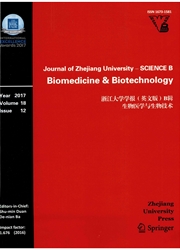

 中文摘要:
中文摘要:
目的:筛选适宜于水稻收获前田间种子快速干燥处理的试剂和方法,为大规模种子生产过程中降低种子干燥成本、提早种子收获及确保种子质量提供基础。创新点:明确了敌草快、百草枯和乙烯利化学脱水剂处理,对杂交籼稻和常规粳稻种子干燥、粒重及发芽的影响,成功筛选出适宜于水稻生产的化学脱水剂敌草快。方法:利用不同浓度敌草快、百草枯、乙烯利等配制的化学脱水剂,对抽穗后第4周的杂交籼稻盐两优88和抽穗后第6周的常规粳稻武运粳7号分别进行喷施。其中,2013年采用了12种不同浓度的试剂处理,以未喷施试剂为空白对照,2014年对前一年试验中表现效果最好的处理(120g/ha敌草快)进行重复验证。处理后2d和4d收获种子,测定种子含水量(MC)、粒重(Gw)、发芽率(GR)、发芽指数(GI)和成苗率(SP)等指标。结论:对水稻喷施不同化学脱水剂2d和4d后,与对照相比,种子MC和SP显著降低(图1和5),但未影响GW、GR和GI(图2~4)。结合两年试验结果发现,喷施120g/ha敌草快具有较好的种子干燥效果,喷施后对种子粒重、发芽和成苗等影响较小(图6-8)。因此,敌草快可以作为水稻收获前种子干燥脱水剂,具有潜在的应用价值。研究结果为今后进一步开展水稻大规模田间种子脱水干燥处理提供基础。
 英文摘要:
英文摘要:
Pre-harvest desiccation may increase the efficiency of seed production. Field studies were conducted to determine the effects of diquat, paraquat, and ethephon applications on grain moisture, grain weight, and seed ger- mination of hybrid rice Yanliangyou 88 (Oryza sativa ssp. indica) and conventional rice Wuyunjing 7 (Oryza sativa ssp. japonica). In 2013, we tested 12 treatments applied at four weeks (Yanliangyou 88) and six weeks (Wuyunjing 7) after heading. Results showed that reductions in moisture content were significant two and four days after chemical ap- plication. Chemical applications had no adverse effects on lO00-grain weight, germination percentage, or germination index, but there were negative effects on the percentage of normal seedlings. Desiccation effects increased with increase in the period after application, while the effect of ethephon combined with diquat or paraquat on desiccation was limited compared with that of diquat or paraquat alone in a short period after application. In 2013, chemical ap- plications reduced the moisture content by from 0.5% to 6.4%, the germination percentage by from 0% to 3.3%, and the percentage of normal seedlings by from 13.3% to 100.0%. Among the treatments, diquat applied at 120 g/ha resulted in effective desiccation with fewer negative effects on grain weight and seed germination in 2013 and 2014. Therefore, diquat may have potential as a pre-harvest chemical desiccation treatment for rice. These results may provide a basis for developing and implementing protocols for large scale field trials.
 同期刊论文项目
同期刊论文项目
 同项目期刊论文
同项目期刊论文
 期刊信息
期刊信息
